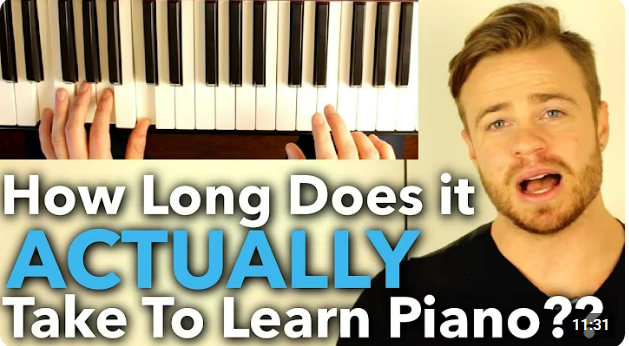Table of Contents
ToggleHow Long Does It Take to Learn Piano?
This is one of the most common questions for anyone starting to learn piano. Maybe you’ve already bought your instrument, found a teacher, or started using an app like Flowkey or Simply Piano. But the big question remains: how long until you can confidently say, “Yes, I can play the piano”?
The honest answer? It really depends. Learning piano is a lifelong journey—there’s no real finish line. Even world-class concert pianists keep learning and improving no matter how advanced they are.
That said, kids often learn faster than adults. Just like how children pick up new languages more easily, their brains adapt quickly. But don’t worry if you’re an adult! You can absolutely become a skilled pianist with patience and consistent practice.
To give you an idea, here’s a rough timeline based on an adult beginner with no previous musical experience, showing what you might be able to achieve over time.
Beginner
Timeframe: About 1 year
After roughly one year of practice, you’ll reach the beginner level. This usually corresponds to playing pieces at a Grade 1 or 2 level (ABRSM). At this stage, you’ll be comfortable playing simple songs and reading basic sheet music. You’ll also start learning fundamental skills like playing one-octave scales and understanding basic rhythms.
Intermediate
Timeframe: Around 3 to 4 years
By the time you’ve practiced for three to four years, you’ll move into the intermediate stage. This level is typically equivalent to Grade 4 or 5 (ABRSM). You’ll have a solid grasp of more challenging skills, including sight-reading, complex rhythms, and playing scales across two or three octaves in most keys. At this point, you’ll be able to learn new pieces on your own, though you’ll likely still benefit from guidance by a teacher or tutor.
Advanced
Timeframe: Between 5 and 10 years
After five to ten years of consistent practice, you’ll reach an advanced level. This is roughly at Grade 8 (ABRSM) or higher. You’ll confidently sight-read music that is several grades below your current level and master scales, arpeggios, and broken chords in every key. By now, you’ll be comfortable selecting your own repertoire and learning pieces independently, without needing much help from a teacher.
How Long To Learn The Piano for Adults?
That’s a tough question — and honestly, the answer varies a lot from person to person. There’s no one-size-fits-all timeline for learning piano, especially as an adult. It really depends on your personal learning speed, any prior musical experience, and most importantly, how much time and consistency you can dedicate to practicing.
Let’s break it down with a few examples. If you’ve already mastered another instrument — say, you’ve played violin up to Grade 8 — you’re likely to progress on piano much faster. In that case, reaching a similar level on piano could take around two years, thanks to your existing music knowledge. But if you’re starting completely from scratch, expect the journey to take at least five years to reach an advanced level.
Your Teacher (or Lack of One) Plays a Big Role
One major factor in how fast you learn is the quality of instruction. A great piano teacher — someone experienced, attentive, and able to explain things clearly — can help you avoid bad habits early on. They’ll guide you with music that motivates you and builds your skills efficiently. With that kind of support, you’ll likely see progress much faster.
On the flip side, if your teacher isn’t very familiar with teaching beginners — and believe it or not, many aren’t — it can seriously slow your progress. Even teachers who say they work well with beginners sometimes don’t have the patience or method needed to nurture a complete novice.
Choosing the Right Learning Method for You
The most important advice here? Find a learning method that fits your lifestyle and personality. Ideally, you’ll want a teacher who understands the common hurdles adult beginners face and knows how to work through them.
But not everyone has access to weekly lessons. Whether it’s due to cost, location, or a packed schedule, traditional lessons might not be an option — and that’s okay. Piano learning apps or self-guided courses can still help you make steady progress. Just keep in mind that without real-time feedback from a teacher, it might take longer to hit your milestones.
The Bottom Line
So, how long does it take to learn piano as an adult? The short answer is: it depends. With daily practice, the right instruction, and a bit of patience, most adults can reach an intermediate level in 2 to 3 years. Hitting an advanced level could take 5 years or more, especially if you’re teaching yourself or learning through an app.
Whatever path you choose, the most important thing is to stay consistent, enjoy the process, and celebrate the small wins along the way. Piano is a lifelong journey — but one that’s absolutely worth the time.
How Many Hours a Day Should You Practice Piano?
This is one of the most common questions among piano learners—and the honest answer is: it depends.
There’s no fixed number that works for everyone. Instead, the right amount of practice depends on two key factors:
How much time you can realistically dedicate to practicing
How long you can stay focused while sitting at the piano
Let’s break this down.
Some people assume that practicing for an hour every day will make them three times better than someone who only practices for 20 minutes. In theory, that makes sense. But in reality, it doesn’t work that way. The quality of your practice matters more than the quantity.

If you’re just running through your pieces and repeating the same mistakes without correcting them, even hours of practice won’t help you grow. You’ll just be reinforcing bad habits.
On the other hand, if you spend 20 minutes in focused, goal-driven practice, you can make real progress—faster than someone who plays aimlessly for an hour. It’s all about being intentional.
That said, the ideal scenario is to do as much focused, effective practice as you can each day. If your practice sessions are productive and structured, then yes—practicing for two hours a day will likely help you improve more quickly than someone who only manages 20 minutes.
Can You Teach Yourself Piano?
Yes, you absolutely can teach yourself piano. In fact, I did—at least in the beginning.
Until around the age of 14 or 15, I was mostly self-taught. I had a decent ear and could figure out melodies by trial and error. I could “play” the piano in a basic way, but I was missing some crucial skills.
For example, I didn’t know how to read sheet music or understand music theory. If you had put a music score in front of me, I wouldn’t have known what to do with it.
Now, it’s totally possible to teach yourself those things online. YouTube, Flowkey, Simply Piano, and other learning apps make that easier than ever. With some patience and dedication, you can definitely learn the basics on your own.
But here’s the truth: having a teacher makes the process smoother and faster. A good teacher can point out things you may not notice on your own—like bad technique, inefficient fingerings, or musical habits that hold you back. They can answer questions, help you through frustrating parts, and guide your progress.
Even advanced players benefit from guidance. When I was in university, I’d still hit roadblocks—maybe a tough chord transition or a confusing piece of music. Having a teacher to help me work through those moments saved me time and stress.
So yes, you can teach yourself piano, especially with today’s technology. But if you can, finding a teacher—even occasionally—can make a big difference in how quickly and smoothly you improve.
For more tips on making your piano practice both efficient and effective, I highly recommend checking out my related article here.
Is Learning Piano Hard?
Let’s be honest—learning any musical instrument is challenging, especially if you’re starting from scratch. Piano is no exception.
But instead of focusing on how hard it is, try to focus on the rewards. Learning piano is a journey, not a race. There’s always more to learn, even for professional pianists.
The truth is, every pianist—no matter how experienced—still practices. Even those in their 70s, 80s, or beyond continue to explore, challenge themselves, and grow. That’s part of what makes music beautiful—it never ends.
Yes, you’ll face obstacles. Some days you won’t feel like practicing. After school or work, you might be tired and unmotivated. You may hit a wall and think, “I’m not getting better.”
But I promise—if you keep going, even when it’s tough, you’ll thank yourself later. Piano takes patience and persistence, but the joy of making music is worth every minute.
Stick with it. Celebrate small wins. Keep learning. And above all—enjoy the music.
Until next time, happy practicing!

